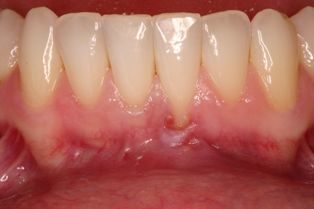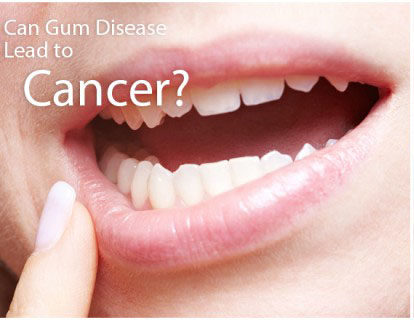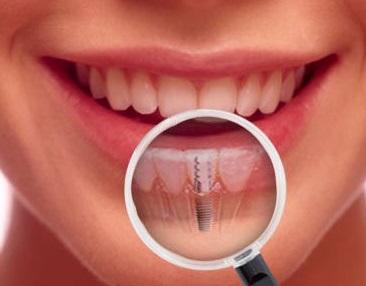Have you noticed that your teeth somehow look longer?
Or that your gum line has become uneven?
Do your gums have an “aged” apearance–what some folks call “long in the tooth”?
If you answer “yes” to any of these questions then you may be suffering from a very common problem called gum recession, or gingival recession. The gums should firmly surround the lower portion of the teeth to protect the sensitive roots and bone surrounding the teeth. This vital tissue can weaken, or thin out, and pull away from the teeth, creating a serious risk of anything from tooth sensitivity to tooth loss. When roots are exposed they can be more vulnerable to decay. And even more concerning is that as the recession progresses down the root, the underlying bone can be lost thus creating a very unstable situation. More information on gum recession can also be found at WebMD.
What causes gum recession?
In some cases, a person may simply be genetically predisposed to have a thinner tissue or gum type. Similarly, misaligned or poorly positioned teeth can be more vulnerable to recession if there is not enough tissue that surrounds the teeth. It may not be possible to prevent these genetic factors, but with extra care and diligence, you may avoid suffering from receding gums.
Are you causing your recession with any of the following?
- Excessive or aggravating brushing habits. Thorough brushing and flossing are critical to good oral health, however, overdoing it can lead to gum recession. Overbrushing or scrubbing can not only cause the tissues to recede but also erode the softer roots of the teeth. Brushing with a hard or even medium bristle toothbrush can also be quite damaging to the gum tissues. Flossing incorrectly, especially “popping” the floss too deeply can contribute to gum recession. And although we love the benefits from electric toothbrushes, sometimes folks will add a “scrubbing” motion to the cleaning action that an electric toothbrush already provides, thus brushing in an aggressive manner.
- Smoking or chewing tobacco. Cigarettes and chewing tobacco can cause significant damage to the gums, let alone overall oral and physical health. Tobacco use quite simply is one of the biggest risks for developing gum disease, which is an infection that destroys both gum and bone tissue over time.
- Bruxism or clenching. Grinding of the teeth or just clenching can put excessive pressure on the teeth and gums, potentially causing the teeth to loosen, the tissues to recede as well as can create pockets around the teeth for bacteria to hide. Often bruxism occurs during sleep and signs may include a tender jaw or headaches. This is often a very easily treated condition and if treated, can help to prevent gum and teeth issues.
- Poor oral hygiene. Just as over-brushing can lead to gum recession, not brushing enough or well can cause recession. The tissues can get very inflamed when too much bacteria is left at the gumline. In these cases, gum recession is secondary to the gum disease. Treating gum disease is essential to preventing further recession much less to save teeth and prevent overall health conditions such as cancer, heart disease, and diabetes to name just a few.
- Other habits. Biting your nails, chewing on pens, or holding objects between your teeth, often as an absent-minded habit can have a similar effect as bruxism. Fingernails or plastic pens can scrape or damage the gums and frequently applied pressure to solid objects can loosen the teeth and result in gum recession.
It is essential when you see gum recession to have it evaluated sooner rather than later by a periodontist–an expert in treating gums and the oral foundation. When gum recession is present, a gum graft is usually needed and a periodontist is uniquely suited to evaluate the severity of the recession and to recommend the best type of gum graft. Dr. Bruce Edelstein, known as “The Gum Doc” is highly skilled at a number of grafting techniques and can make a personalized recommendation for your recession. The office of Dr. Edelstein not only prides themselves on providing excellent grafting outcomes but helping patients have the easiest and most positive experience with their gum grafting procedure! The best news is that the gum graft has a very high success rate and the results are often long-lasting! Call us today to help you with your recession at 404-352-1911.



 Gum Disease is Tied To This Particular Risk for Older Women!
Gum Disease is Tied To This Particular Risk for Older Women!